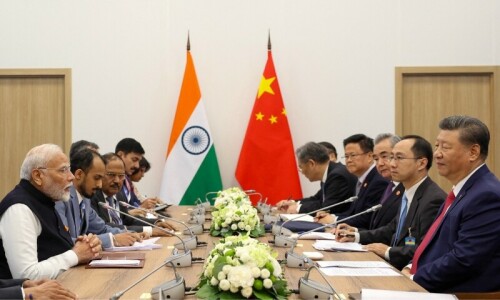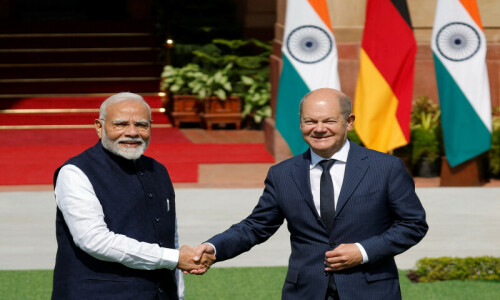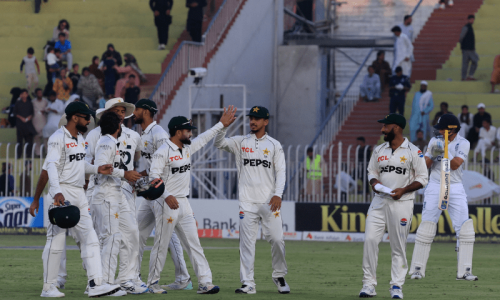THE ‘caretaker’ government (read: the security establishment and its lackeys) has embarked on yet another ideological offensive about the incredible benefits of privatisation under the guise of the Special Investment Facilitation Council. Foreign donors, the mainstream intelligentsia and bourgeois parties are faithfully toeing the line.
This is happening even as the painful effects of power-sector privatisation play out in the homes of every working-class family. There are certainly other reasons for the astronomical electricity bills that triggered recent bill-burning protests, including the state’s unwillingness to tax the rich. But our rulers’ willingness to hand over wholesale power production to the so-called Independent Power Producers (IPPs) at the behest of the World Bank and IMF back in the 1990s is as big a cause of the current crisis as any other single factor.
In short, the state agreed to retain only the power to distribute electricity while allowing private companies — initially foreign and later domestic — to produce it, whilst also guaranteeing to pay these companies in dollars ad infinitum.
There is now more power capacity in Pakistan than actual demand but loadshedding still takes place because the government cannot make payments to IPPs. It does not have enough dollars to pay them without becoming insolvent.
We should be compelled to imagine big structural policy changes.
Most IPPs run coal-fired thermal plants, which not only contribute directly to our already serious climate crisis but also require inordinate amounts of imported oil. Who pays for this oil? Not the IPPs but the government, which conveniently passes on this burden to the masses. Where does this leave us? Intellectually and politically, it should compel us to once again imagine big structural policy changes. Like nationalisation.
It is a measure of the successes of neoliberal ideology in the world, and that of the Zia military junta in Pakistan especially, that the experience of nationalisation in the 1970s has become accepted as a disaster. The Bhutto-led PPP regime that enforced the nationalisation policy had many failures, and the takeover of numerous private industries by the postcolonial bureaucracy was not beneficial to the working class. But the story is too complex to be decried purely as an abomination that must never be repeated.
The Pakistani state invested more in manufacturing industry during the 1970s than at any other time. Yes, the Ayub dictatorship presided over industrialisation, but this was accompanied by enormous inequality, encapsulated by the regime’s own chief economist, Mahbub ul Haq who said that 22 families controlled virtually all of Pakistan’s wealth.
In contrast, the 1970s featured the Pakistan Steel Mills’ establishment, as well as publicly owned heavy industrial complexes in a few locations across the country. Some experts point to stuttering economic growth rates through that period, attributing them to nationalisation and related policies. But they neglect to mention the enormous impact of the secession of East Pakistan, which was a major driver of economic growth in the 1960s.
More generally, investments in manufacturing industry such as those undertaken in the 1970s do not produce demonstrable effects in the very short term. Indeed, Zia’s dictatorship benefited greatly from a number of policies introduced by the previous regime, including public investment in heavy industry and labour migration to the Gulf, which started in 1974 but only bore fruit in the form of remittances by the end of the decade.
The specific impact of nationalisation per se — mostly of rice, ghee and sugar mills — was mixed. The economic impact on growth was actually not very substantial and the most significant, long-lasting outcome was political; trader-merchant segments reacted furiously, funding and peopling the Pakistan National Alliance’s Nizam-i-Mustafa movement which led to Bhutto’s overthrow by Gen Zia. Industrialist families like the Sharifs developed a visceral hatred for left and working-class politics, not to mention the Bhutto family.
The result was a mandate for the Zia regime to not only de-nationalise, but also block land reform and crush left progressives, including trade and student unions. The alliance between trader-merchants and the religious right under the military establishment’s patronage was permanently inked. And the rest is history.
Denationalisation was globally in vogue throughout the 1980s, led by Thatcher-Reagan with lieutenants like generals Zia and Pinochet in the Third World. Today, countries like France are overturning neoliberal orthodoxy and nationalising commanding heights of the economy — most notably electricity. It is high time we stop treating the privatisation-nationalisation debate as a taboo that cannot be questioned.
The writer teaches at Quaid-i-Azam University, Islamabad.
Published in Dawn, September 15th, 2023











































Dear visitor, the comments section is undergoing an overhaul and will return soon.